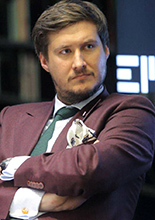DA alumnus Dominik P. Jankowski on his career since graduating from DLG 45 in 2009
 What memories do you have of your time at the DA?
What memories do you have of your time at the DA?
The year that I spent at the Diplomatische Akademie Wien was a memorable experience. In fact, I always wanted to graduate from a diplomatic school. The DA had an excellent reputation in Poland and offered a rich course curriculum combined with solid scholarship opportunities. My time at the DA was enriching both professionally and personally. The DA combined a truly unique atmosphere with a diverse international environment.
How did the DA prepare you for your career?
The DA offered three elements that were crucial in my career. First, foreign languages. When graduating, thanks to the excellent languages classes, I fluently spoke English, German, and French, and considerably improved my knowledge of Russian. Second, multilateralism. The DA helped me to properly understand the value of multilateralism in foreign and security policy. Third, professional network. The DA was a hub for devoted and inspiring students who later became an important part of my professional network.
What do you do for a living now and why did you choose this specific profession?
Since my graduation from the DA, I have served in different security and defence policy positions in the Polish public administration, including as Senior Expert at the J5-Strategic Planning Directorate of the General Staff of the Polish Armed Forces and Head of the Strategic Analyses Division at the Polish National Security Bureau. Since 2014, I have worked at the Polish Ministry of Foreign Affairs, including as Head of the OSCE and Eastern Security Division at the Security Policy Department. Currently, I serve as Political Adviser and Head of the Political Section at the Polish Permanent Delegation to NATO.
What do you enjoy about your profession? What professional challenges fascinate you?
Thanks to my numerous previous positions, I had a chance to deal with security policy from multiple angles – from military one, through crisis management, to multilateral diplomacy. Security policy means that you have to be able to work on enhancing the deterrence and defence posture of your country while at the same time conducting dialogue with your current and potential adversaries. Security and defence policy also requires constant intellectual adaptation and readiness to face new threats and challenges, including emerging and disruptive technologies or proliferation of weapons of mass destruction. I try to constantly strategize about the future security policy scenarios in order not to be behind the curve. In 2021 this led me to editing, jointly with Professor Tomasz Stępniewski, of a book on the future of NATO (“NATO in the Era of Unpeace: Defending Against Known Unknowns”).
What are your ambitions for the future?
In 2021 I got selected for a prestigious fellowship with the Harvard University (The Arms Control Negotiations Academy – ACONA). One of my ambitions for the future is to contribute to concluding a new arms control treaty between multiple parties. There is no better place to sign it than the Diplomatic Academy of Vienna!
[September 2021]